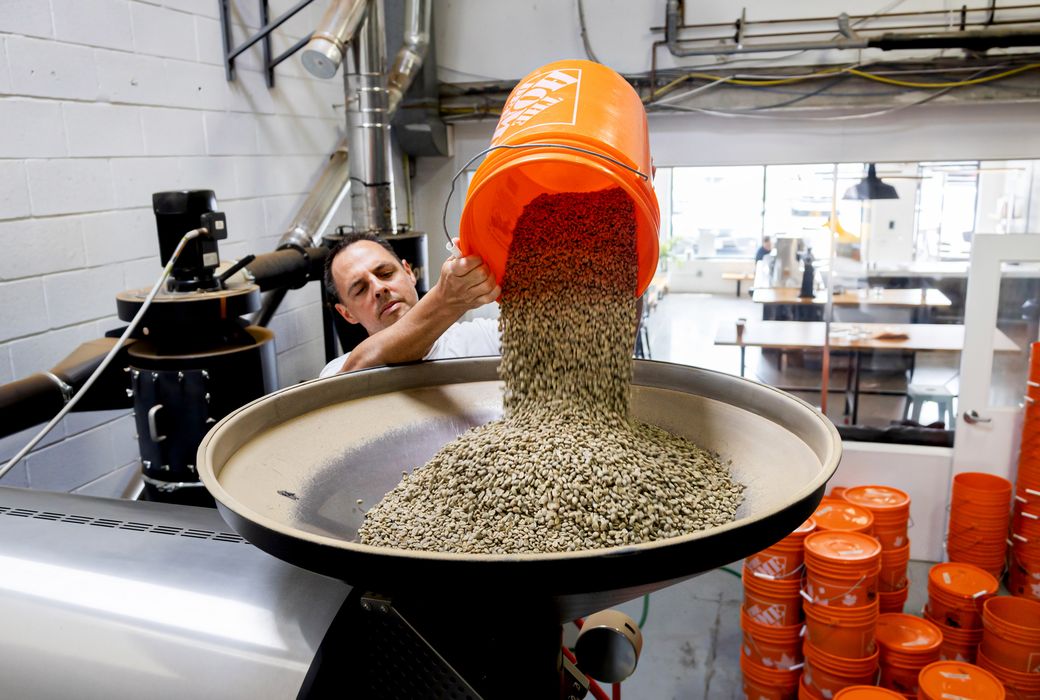Matcha Matcha
Matcha Matcha is serving up exactly what its name implies: matcha green tea, over and over, in abundance.
Operating just as a coffee shop would, this might be Toronto's only matcha cafe of its kind.
A sleek, lounge-like work-friendly space and a robust hot and cold drinks-focused menu make you feel like you've entered the next trendiest coffee craze — but they're only highlighting the green here. Like matcha can be itself, the experience and the craftsmanship put into Matcha Matcha has been a ceremonial one (of course, they do only use ceremonial-grade matcha here).
Tucked around the corner of a bustling street, the narrow space is incredibly modern and stylish. Though it's filled with shades of grey, miniature tables and cubist corners, there's still a warmth to it.
That's likely thanks to the youthful crowd that's already formed both inside and outside, even when visiting at 11 A.M. on a weekday.
Matcha Matcha's arrival to Toronto's cafe scene was a rapid wildfire, as red as their drinks are green.
Within days of opening, line ups over an hour long were forming outside the condo building the cafe resides in, and the online discourse quickly became insurmountable.
The sudden and extreme popularity is just part of what had many assuming Matcha Matcha was Toronto's first location of some well-known franchise — but you'd be wrong; this is a one of one.It's an easy mistake to make; from the hype, to their superb branding, you'd assume this operation was a long-running brain child, that had been through several iterations to get to this successful point.
And in a way, it was.
The concept and philosophies behind Matcha Matcha had been in the works for two years, shares Matcha Matcha's marketing lead and project manager Jess Kim, who's just one of the several young, creative 20-somethings behind the name.
The popularity Matcha Matcha quickly gained is simply a testament to great branding and good old fashioned word of mouth, that Jess had the pleasure of fuelling.
"I just really believed in this product," Jess tells blogTO.
“Our main focus was just to get people to try [the product]," she shares, regarding the events Matcha Matcha hosted in its early opening days that captured eyes thanks to their big line ups.
"I wanted it to feel authentic; people were actually coming in just to try, and then sharing their honest thoughts."It's no surprise that their thoughts were pure appreciation and joy: the crew has made matcha — an, at times, polarizing or abrasively flavoured drink — approachable and fun.
Matcha Matcha's store operations lead and menu developer Dan Song ensured that not only matcha, but Asian representation, got the starring moment it deserved.
Many drinks come with an Asian influence, featuring ingredients like pandan or yuzu fruit, to highlight those culturally significant flavours.
The BLU latte gets its unique colouration from a combination of ube, blueberry and lavender.
That sweetness pairs perfectly with the earthy matcha, and the whole drink has a pleasant fruity, cereal milk-like flavour.
All of Matcha Matcha's menu items are within the $6-$7 price range.An Asian-influenced drink on the opposite end of the flavour spectrum is the Matcha Lemonade, that comes sparkling and with yuzu fruit.
For anyone unfamiliar with the flavour profile of the citrus fruit yuzu, this is a must-try; tart like a lime, acidic like a lemon and floral like an orange, the oftentimes far too gently-applied yuzu has an excellent punchiness here. "Whenever I'm eating or drinking something, I like to feel like there's a lot of soul put into it," says Dan, and his care is incredibly apparent in each sip.
Strawberry Matcha lattes took cafe menus by storm this summer, but it was a frequent disappointment to find most tasted of artificially sweet berries.
At Matcha Matcha, the strawberry drink has much more of a jammy, musky strawberry flavour to it — and the strawberries still have their chunky bite to them. If you're eager to participate in an adventurous drink, but find the bold menu flavours intimidating, the Coco Pandan latte is an excellent safe start.
The familiar flavour of coconut meets the slightly green, vanilla-esque profile of pandan to create a drink similar to your standard matcha latte, whilst still maintaining a dynamic flare. Though the highlight is certainly their drink menu, their creativity with matcha also shines in a simplistic sweet treat.
A matcha and hojicha ice cream twist is available — as if Toronto needed another reason to be excited for warmer days.
The deep and roasted nutty flavour of the hojicha side is balanced well with the brighter, sweetened earthy notes of the matcha side, and it's charmingly sprinkled with the teas' powders.
"Before we even started developing the menu, we had separate tasting sessions just for matcha powders, from different areas of Japan," Jess shares; currently, they offer a matcha from a small farm in Kyoto that will soon be purchasable in-house.
Though an arduous process, it's a thoughtful one. "Everyone on the team is very focused on attention and detail, and I hope it shows in the product," Dan tells us.
But Matcha Matcha's creations aren't the only thoughtful and delicious product available at the cafe.Japanese-influenced baked goodies by local Toronto purveyor Millie Sweets are up for grabs, though get there early — they've been selling out fast.
Known for her crepe cakes, Millie owner Christinn Hua had to provide her matcha cake to the establishment, which combines unctuous cream with that rich, grassy tea flavour.
Her burnt basque cheesecakes, in the standard flavour as well as a red cacao one, are available too. I can't recommend indulging in this unique creation enough; the caramel-y tang of the burnt cheesecake gets such a decadent perk with the addition of that slightly tart, berry-ish cacao.
Matcha Matcha's owner, Andy, has been a longstanding customer and fan of Christinn's work and it's been a joyous and inevitable partnership.
"[Matcha Matcha]'s philosophy was so aligned with Millie's, I was just kind of blown away," Christinn tells us, adding that there is an exclusive Millie x Matcha Matcha dessert likely on its way in the near future.The harmonious (and convenient) marriage of having excellent branding and a trendy product whilst being located next to a university campus of social media-hungry young creatives has blessed Matcha Matcha — though customers waiting in line ups outside might not always feel that way.
As appreciative as they are of their immediate popularity, the team at Matcha Matcha don't take it lightly.
"It creates an expectation for people: they think 'Oh, this must be worth waiting two hours in line for' — it's scary," says Dan, who poured his soul into a menu that, he hopes, resonates as more than just a poured drink.
"But it's one of the most gratifying things when people do wait an hour or two, get a drink — and say it was worth the wait."
Matcha Matcha is located 407 Church St.
Fareen Karim









